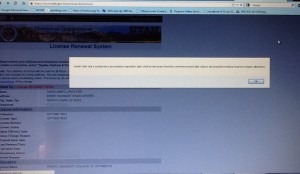 Friendly Reminder that Utah Expiration Dates are Two Years
Friendly Reminder that Utah Expiration Dates are Two Years
When I went to renew my Utah optometrist license, I was greeted with this pop up:
Since my photo is grainy, it says,
“Under Utah law a contact lens prescription expiration date shall be two years from the commencement date unless documented medical reasons require otherwise.”
Here is the excerpt from the Utah Code regarding “Contact lens prescription”:
58-16a-102. Definitions.
(3)
(b) A prescription may include:
(i) a limit on the quantity of lenses that may be ordered under the prescription if required for medical reasons documented in the patient’s files; and
(ii) the expiration date of the prescription, which shall be two years from the commencement date, unless documented medical reasons require otherwise.
I would say it is pretty standard practice to make youth Rx’s one year, but my advice to other Utah eye doctors would be to make sure you have a check box in your chart documenting how the youth’s Rx is still changing which requires yearly monitoring, history of eye infections and need to yearly monitor eye health, etc.
I am not exactly sure when this law came into effect, but I have known about it since 2006 after I moved to Utah. From intermittent observation of outside Rx’s brought in to my vision center or patients coming in for an exam, I would say about half of the area eye doctors know about this law. Either ignorance or they document every little thing as an excuse to yearly monitor contacts. I don’t want to slight The Vision Council’s campaign of “Check Yearly. See Clearly.” but the law is the law.
What would you say is sufficient medical reason to change an adult’s contact lens Rx to less than two years?
- Seasonal allergic conjunctivitis? What would you change before two years after recommending Pataday/Alaway, ClearCare, and daily disposable during the worst weeks?
- Contact lens-related dryness? What would you change before two years after recommending Oasys/Biofinty and ClearCare/Optifree PureMoist and Refresh Contacts?
- Mild corneal neovascularization? What would you change before two years after recommending a silicone-hydrogel, adhere to manufacturer replacement schedule, and no overnight wear?
I would be careful because if you get too knit-picky, your patients will go elsewhere for exams.
Tags: contacts, doctors, Government, law, optometrist, Organized Optometry, patients












A hypothetical question…
If Utah law were written such that a contact lens prescription was open-ended, such that an eye doctor could have the prescription expire whenever he/she thought prudent, what would you write as the expiration date?
And what if Utah law changed it to say 5 years, or 10 years? Are you going to write an RX for 10 years because the person’s eyes looked healthy at today’s exam?
And what if the “standard of care” is 1 year contact lens rx (good argument that in 99% of U.S. it is…). And you write for 2, and your patient has corneal ulcer from overwear in 18 months, because your rx allowed another year’s supply without an exam, and you are taken to court for not following the “standard of care” for your patient. Do you think the Utah 2 yr law will be a good defense for you? Are you willing to risk it?
From a pure liability standpoint, writing a 1 year rx does not increase my liability, a 2 year rx does. In my opinion (which was verified when I called state board representative to ask about it), you can/will never be taken to task for a 1 year rx, but the 2 yr rx increases risk, so why do it?
So while it may be perfectly legal to write 2 yr cl rx, I don’t agree that it’s the most prudent. This law was changed due to efforts of 1-800, and their not wanting patients to be burdened with another eye exam prior to purchasing more contact lenses. In other words, this law was basically worded by 1-800, and despite organized optometry’s efforts to keep it out, 1-800 wielded so much political muscle, our efforts were in vain.
As to documented medical reason. I never rx cl’s unless I “document” that I have prescribed a “medical” device, the cl itself. In my opinion, the fact that I have prescribed them contacts is my justification for asking them to receive an eye exam in 1 year. And I tell them “It’s not because your contacts will stop working, nor because your rx will change, it’s to allow me to verify that your eyes are still healthy despite your use of contacts and to be sure that your eyes still healthy enough to consider updating that rx for another year.”
I think its folly to assume that just because a person’s eyes look healthy today, that I can predict they will stay healthy (and follow all use/care instructions for contacts) for the next 2 years. Many of my patients can’t do it for even 1 year. This law is poorly written, is not in the interest of the health of patients, and I strongly urge you to reconsider your position.
Those of us who choose 1 year rx’s have good reasons for doing so, it’s not so clear cut as you are making it seem.
When the Utah law legislates the standard of care, I am willing to bet the Utah court wouldn’t count that against an ECP.
I don’t think that wondering if a patient’s eyes are going to change from healthy today to unhealthy 13 months from now counts as a “documented medical reasons requiring otherwise.”. If I thought that, I wouldn’t Rx contacts in the first place.
What’s more likely to happen? a)Pt gets burr in butt that I made their CLRx expire for one year when all the other docs make it two so I get the heat from DOPL or b)it’s my fault someone went blind from contacts because of a two year expiration date.
Here’s what I would like to do. In California, there are PCPs who Rx Marijuana without an exam-just pay the money. I could be a millionaire by rubber-stamping everyone’s contact lens Rx online for $20. Then I could spend my days doing actual eye exams on people who give a care about their eye health and vision and not just returning because I’m holding a script over their head.
It’s my libertarian hope that someday all drugs, devices, and labs can legally be purchased without requiring a Dr. Rx, with the understanding that buyer beware.
Most people will learn to still seek out professional consultation before starting self treatment- even without big brother ordering us.
I once wrote 2 yr cl rx’s, thinking that I should follow the “letter of the law”. I couldn’t fathom why the change from 1 yr to 2 yr, and I certainly didn’t believe it was because patients eyes are more healthy with contacts now than in the past, I was seeing just as many problems (red eyes, non-compliance, infection, etc.) as when I practiced in a “1 yr state”.
I called an optometrist I know who is on the state board and asked why the change, and what he thought about writing 1 yr rx’s. His response, in a nutshell, is that the standard of care is still considered 1 year, despite this law. He also said that your judgment as a doctor still determines the expiration date, which might be as short as 6 months, and that he himself rarely if ever wrote an rx for longer than 1 year.
I don’t think standard of care is or can be legislated. Standard of care is defined by what most doctors would do / are doing in similar situations for similar patients. This is why the standard of care for glaucoma is slowly changing to include more/better tests. Also perhaps a reason why trying to create a standard of care through legislation is a stupid idea, it creates (arbitrary?) restrictions for something that should be left to doctors judgement (which I argue the current law still allows for). Feel free to call the state board as I did…
Legislators have very recently changed Utah law to state that all spectacle rx’s now have no expiration date, “unless medically documented reasons” in the chart suggest otherwise. Does that change the standard of care again, should we now never recommend/encourage eye exams or rx checks on people whose eyes are healthy on the day of their exam? I would argue periodic eye exams are still of value, and still recommend an exam every 2 years, and expire the spectacle rx every 2 years. Yourself?
If you were to live in a state where there was no legislated requirement of cl expire date, what would you choose…
a libertarian notion of no expiration date at all (only come in for an exam once you have started to have problems…)
or an expiration date of your choosing (6 months? 1 yr? 5 yrs?)
I would argue that optometrists have already hashed this out in day to day practices over the last 20+ years, and most in most states agree that the best standard (if we are to have one) is 1 year (if no evidence of problems) or sooner (especially if serious problems evident).
Don’t be afraid of what your patients think if you want to do a 1 yr rx. Better to be their eye doctor instead of their buddy who writes a long rx. If a 2 yr rx was the only thing defining an optometrist and what patients cared most about, your office would be flooded with everybody elses patients and we would all be out of business.
And it doesn’t have to be your fault that someone went blind from contacts because of a 2 yr rx date. All it takes is 1 central corneal ulcer with enough scarring to lose lines of vision, and for a jury to be told enough to convince them you weren’t following the standard of care, and you get to pay. Utah law notwithstanding.